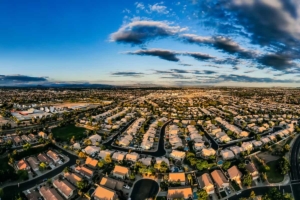Short-term rentals, often associated with companies like Airbnb and VRBO, have gained in popularity in recent years as a lodging option for vacationers and another way for owners to generate income. Some Arizona residents, however, think short-term rentals are neighborhood nuisances that deprive families of places to live, whereas others believe people have the right to use their private property as they please.
“Arizona has investors who are buying homes that would’ve otherwise gone to families and turning them into long- or short-term rentals. One in five houses is bought for rentals throughout the country. Here in Arizona, 30% of homes purchased are for rentals,” says Greg Hague, CEO of 72 Sold, a real estate company that aggressively markets residences before they are shown to buyers.
READ ALSO: Are Californians ruining the Arizona housing market?
The potential for profit from short-term rentals is significant, especially in towns dependent on tourism.
“In late May, there were only 17 single-family homes available in Sedona. I talked to one of my agents, and he said that half of what was being sold was going to investors for short-term rentals — and normal buyers can’t compete,” Hague remarks.
Investors hold a distinct advantage when competing against typical house hunters: abundant credit.
“An investor can find a $400,000 home and finance the whole thing with a line of credit. You couldn’t do that as a normal buyer,” Hague says. “Investors make so much money with these rentals that they can pay whatever they need to pay to outbid normal buyers, who need to get financing and an appraisal.”
Impact of short-term rentals on communities
Jerome, a small town about 30 miles southwest of Sedona, has seen a similar trend of residences being bought up and turned into short-term rentals. This has affected local businesses, the town’s tax base and the sense of community shared by the residents.
“People who want to take a piece of zoned residential property and run it in a commercial manner as a short-term rental are a nuisance, and they’re also breaking our zoning code. These people don’t have unlimited property rights. They’ve purchased a residential home and are using it as a commercial endeavor without licensing and without paying commercial taxes,” comments Rebekah Kennedy, former Jerome council member and owner of Amore Pin Up Boutique and Amore Pin Up Accessories.
In 2016, the Arizona Legislature passed Senate Bill 1350, which prohibits communities from putting any zoning-like restrictions on homes bought for short-term rentals. This has left communities such as Jerome with little recourse. The housing supply is strained, meaning that some residents can’t afford to live in town anymore and are moving down the mountain Jerome is built upon and to nearby Clarkdale.
Impact on hospitality industry
The influx of rentals also affects the local lodging industry. Andrea Prince, owner of the Surgeon’s House Bed & Breakfast, has been in business for 28 years. Two years ago, she noticed a decline in business and reached out to the other five people with locally owned and operated lodging establishments in Jerome.
“I started out the meeting by saying my numbers are dropping and if all of you tell me you’re having banner years that tells me that I’m doing something wrong. But everybody’s numbers were dropping, and the only thing we could figure was it had to do with the short-term rentals,” explains Prince. “Granted, if you’ve got a family of five, we can’t beat the prices to rent a house, but we should be able to control and tax that industry,” she adds.
Folks who choose to stay in a short-term rental, Prince argues, are more likely to bring groceries and cook for themselves, depriving the town of additional tourism dollars. For homeowners like Kennedy — who lives near seven short-term rentals — parties are a constant annoyance.
“Sometimes when you say, ‘Hey, keep it down,’ they throw beer cans at you. Then you have to call the person who owns the vacation rental, and they say, ‘Well, why did you call me, call the police,’” notes Alex Barber, former Jerome mayor and current town council member.
Kennedy adds, “I know we are a tourist town, and people tell us all the time how grateful we should be for being so popular that everybody wants to be here. However, there must be a balance. What we’re asking for is respect for the line that we need to draw in order to have good relationship between residents and tourists. We need a place to live.”
Private property proponents
The Arizona Vacation Rental Association (AZVRA), which advocates for the rights of short-term rental owners, understands that there’s a coalition of Arizonans who want to see the short-term rental market more tightly regulated — and representatives in the legislature are listening. Recently, House Bill 2875 and Senate Bill 1554 sought to limit some of the protections afforded to short-term rental owners in Senate Bill 1350. Both attempts failed due in part to campaigning from the AZVRA.
But just because the AZVRA fought against the changes doesn’t mean it is ignoring communities’ call to action. The association promotes a “Good Neighbor” policy to its members that encourages owners to provide neighbors with 24/7 contact information, enforce local noise ordinances and prohibit large parties, among other best practices.
“We created an association with people who own these rentals and put together a process of standards that they can adhere to. By joining the association, we can communicate with each other, we can listen to each other’s problems and emphasize the ‘Good Neighbor’ policy,” says Barry Goldwater Jr., former U.S. Congressman and member of the leadership team at AZVRA. “But we hear the complaints, and I think the industry is doing everything it can to try to clean that out and stop some of those party houses.”
Tim Scarpino, executive vice president of global growth at Parsons Villas and member of the leadership team at AZVRA contends that troublemakers represent a fraction of operators. “Our chief data officer, Mark Beauvais, did our first real economic impact study. With the data that he got using police reports from the City of Scottsdale and the number of vacation rentals that are currently shown on the AirDNA database, he found bad actors represent half of 1% of operators in the market,” Scarpino explains. Airbnb recently delisted 50 properties that received regular and repeated complaints, adds Goldwater.
Nuisance or nice-to-have?
The AZVRA argues that the budding short-term rental market is a boon for the state. According to the association’s study, short-term rentals contributed $350 million in tax revenue to Arizona in 2020, total spending by visitors to Arizona exceeded $3 billion in the same year, and the industry supports 40,000 jobs. “The average Airbnb guest stays five nights as opposed to 2.8 from traditional hotel guests. Airbnb guests spend about 2.1 times more money in the local community than typical visitors,” Scarpino comments. “The growth of hotel occupancy mirrored the growth of short-term rental occupancy, meaning that we were not cannibalizing each other’s leads, but rather, we were bringing more tourists to the state and more revenue to the tourism budget of Arizona.”
When it comes to home supply, Scarpino maintains that short-term rentals are not contributing to the current supply shortage in a meaningful way. “If we look at pre-pandemic numbers, short-term rentals reduced by about 10% in 2020, whether they became long-term rentals or were sold. But I have not seen any statistical evidence that shows that short term-rental purchases are contributing to the lack of supply.”
Arizona’s appeal has drawn in new residents from around the country who have caused a supply strain, according to Goldwater. “It’s not only happening here, but it’s happening in places like Boise, Idaho, and in Florida and Texas. People are trying to get away from high taxation and heavily regulated, poorly run cities in New York and California. There’s more demand than there is supply, but eventually this will straighten itself out,” he says. Scarpino adds that lack of supply is evident in cities across the nation, even in places such as Pittsburgh that don’t have a high concentration of short-term rentals.
Goldwater concludes, “We feel blessed that we have this opportunity to provide a service to people who want to travel. We try to work with local government and with the homeowners who rent out their properties to make it a better and more friendly neighborhood. But this is part of freedom. This is part of the free market system. We just want to provide a service and get a return for our efforts. At the same time, we don’t want to be stepping on other people’s toes. We’re very alert to the problem. And we’re working diligently to make it better.”




